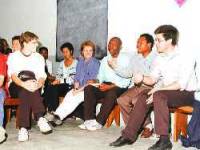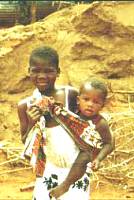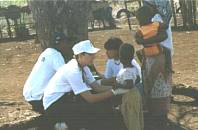|
Solidarity Summer 2001
Mozambico
The activity of the Community. News from Matola to Goba
Here are some pages from the diary of the people from the Community of Sant'Egidio who, during this summer period, are involved in bringing health and nutritional aid to Goba and Matola.
Diary of the Nutritional Centre of Matola
In Matola there is a Nutritional Centre which is attended by about 150 children many of whom have Aids. Since the end of July several people from the European Communities of Sant'Egidio are helping out in the centre.
 The beginning of our work at the Nutritional Centre of Matola was overwhelming in every sense. Hundreds of people turned up so we had to change the work schedule and procedures of the surgery. In fact one of the main problems was that contact with a doctor was so rare and so much in demand that numerous people in perfectly good health joined the lengthy queues so as to be seen by the doctor and get some medicine. Quite often someone who had already seen the doctor would queue again for a second visit. The beginning of our work at the Nutritional Centre of Matola was overwhelming in every sense. Hundreds of people turned up so we had to change the work schedule and procedures of the surgery. In fact one of the main problems was that contact with a doctor was so rare and so much in demand that numerous people in perfectly good health joined the lengthy queues so as to be seen by the doctor and get some medicine. Quite often someone who had already seen the doctor would queue again for a second visit.
At the same time we realised even more the importance of nutrition and how necessary it was to develop the Centre in this sense. For example we noticed a great difference between those children who came to the Centre regularly and those who didn't; the first were lively, reactive, capable of planning and running about. The others appeared to be affected with real psycho-motor problems. This struck us all the more as this pattern occurred amongst children of the same family. The problem of exclusion is enormous. For example we found a mother with three children and only one had the right to use the canteen. When he had finished his meal the mother and the other children literally threw themselves onto what remained.
We have also realised that so many people suffer badly from hunger that a lot of them are not able to reach the centre. In many cases we found them at home, too weak to move also because a large number of them are suffering from Aids.
Once we found a widow lying near the door of her house. She had tuberculosis and was painfully thin. Her five young children were with her at home without food or any type of care. Really home help represents the answer to these situations which are not rare in Matola and Mozambique. Almost always the question of food is of primary importance.
 All this together with the fact that the centre functions with insufficient food supplies makes us realise that more food should be made available. We can recall a whole series of solutions adopted in Albania to reinforce the protein supply: biscuits with added proteins, eggs, beans, full milk, chicken and fish. We shall also have to think of distributing food packages at our centre and in the homes. All this together with the fact that the centre functions with insufficient food supplies makes us realise that more food should be made available. We can recall a whole series of solutions adopted in Albania to reinforce the protein supply: biscuits with added proteins, eggs, beans, full milk, chicken and fish. We shall also have to think of distributing food packages at our centre and in the homes.
Together with hunger there exists another condition among the children who are abandoned and deprived. On our first day in Matola we came across little girl who, according to the nuns, was deaf and dumb. In reality, after a week in our company where she was loved and cuddled, what was our surprise when we heard her stammer out her first words. An d since then the progress has been impressive.
We can't help thinking of all those children, orphans or not, all over the country, abandoned in the streets and in any case deprived of family and affection who are growing up as though they were deaf and dumb. We never cease to wonder how in a similar situation a little help from us gives results that are nothing short of miraculous.
Leonardo
Palombi
Diary from Goba
In the village of Minchagulene (Goba) bordering on Swaziland, hundreds of people, many of whom are refugees, live in straw and mud huts in extreme poverty. Visits to the children, almost all of them undernourished and sick, began in June.
 The road which leads to Goba gets worse and worse as we leave Maputo behind. The houses get fewer and fewer while in our minibus we cross wide stretches of green dotted with pools of water under a clouded sky. A notice tells us that we are in the "town" of Goba, a small cluster of huts with tin roofs, houses in cement and a church from the old mission. This is an attractive building in Portuguese style unfortunately in very bad condition. A large deep crack crosses the fa�ade. To our surprise and dismay we discover that fifty children are inside the church having their lesson as the local school is too small to contain them all. The teacher who received us with great cordiality is aware of the danger but says "These children have no other place for their lessons". This is another aspect of the dramatic problem of education in Mozambique. For the upkeep of the schools, 36 million dollars a year (which are less than 80 billion lire) are needed. But the Ministry only possesses 5. And that is why every day thousands of children set out for dilapidated buildings with leaking roofs, sometimes even carrying a chair on their heads so as not to have to sit on the ground. The road which leads to Goba gets worse and worse as we leave Maputo behind. The houses get fewer and fewer while in our minibus we cross wide stretches of green dotted with pools of water under a clouded sky. A notice tells us that we are in the "town" of Goba, a small cluster of huts with tin roofs, houses in cement and a church from the old mission. This is an attractive building in Portuguese style unfortunately in very bad condition. A large deep crack crosses the fa�ade. To our surprise and dismay we discover that fifty children are inside the church having their lesson as the local school is too small to contain them all. The teacher who received us with great cordiality is aware of the danger but says "These children have no other place for their lessons". This is another aspect of the dramatic problem of education in Mozambique. For the upkeep of the schools, 36 million dollars a year (which are less than 80 billion lire) are needed. But the Ministry only possesses 5. And that is why every day thousands of children set out for dilapidated buildings with leaking roofs, sometimes even carrying a chair on their heads so as not to have to sit on the ground.
Finally we move towards the meeting place with the local community, an open space surrounded by a few huts. During the morning we visit 60 women and children and the doctors and nurses find an astonishingly high percentage of illnesses and parasitism. Almost all the children have ringworm and their swollen bellies indicate the presence of intestinal parasites. The mothers are so anaemic that they have difficulty in carrying their babies who are red headed, an evident sign of kwashorkor, a syndrome of protein and energy malnutrition which affects them as a consequence of a diet consisting only of rice.
And then we find many cases of bronchitis, bilharziosis, forms of malnutrition, neuromuscular diseases, sores and wounds. But we also find the hope, the trust, the gratitude of these people, of the little ones who eat the first sweets of their lives, and avidly sip the honey like vitamin complex. We are different from the other white people whom they met on former painful occasions, such as those who a month ago abducted some children who have never been heard of since.
It is a little corner of the African world but it could be in any part of Mozambique, a world without drinking water, without water for washing, without clothes, without shoes, without help, without hope. A world exposed to the heat and rain, to the insects, to hunger, to thirst. We might say a desperate world but we might also say how little is needed to change everything and to bring some dignity and happiness to these peoples lives. It is easy to give these little ones a glass of water today but it would be wonderful to be able to give it to them tomorrow too.
Leonardo
Palombi
|

